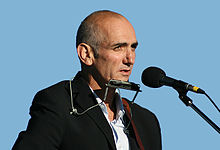| Paul Kelly discography | |
|---|---|
 Paul Kelly, November 2007 | |
| Studio albums | 28 |
| Live albums | 6 |
| Compilation albums | 8 |
| Video albums | 4 |
| Music videos | 42 |
| EPs | 4 |
| Singles | 66 |
| Soundtrack albums | 9 |
The discography of Paul Kelly, an Australian rock artist, includes solo releases, those from various bands that Paul Kelly has led,[nb 1] and material from the related projects.[2] Paul Kelly, under various guises, has released twenty-eight studio albums, sixty four singles, forty-two music videos, and contributed to ten film / television soundtracks and scores.[3]
In August 1978, Paul Kelly and the Dots was formed from the remains of Melbourne band High Rise Bombers.[2] In 1979, they released their debut single, "Recognition", on Mushroom Records and followed with other singles in 1980 including "Billy Baxter" in October, which peaked at No. 38 on the National singles charts.[4] Their debut album Talk followed in March 1981,[1] which peaked at No. 44 on the National albums charts.[4] Their single "Alive and Well", from the second album, Manila, had a video clip directed by Jack Egan in July 1982.[5] After the Dots folded in late 1982, Kelly was without a recording contract.[6] The Paul Kelly Band was formed in 1983, however by late 1984, Kelly had disbanded this group.[2] His next solo release was the single "From St Kilda to Kings Cross" in April 1985, with the associated album Post.[4]
By mid-1985, Kelly had formed Paul Kelly and the Coloured Girls and their first single was "Before Too Long" in June 1986, which peaked at No. 15 and was followed by a double LP Gossip in September, which peaked at No. 15.[4] Gossip was trimmed back to a single LP for its 1987 international release on A&M Records under the name Paul Kelly and the Messengers.[2][7] Australian releases still used Paul Kelly and the Coloured Girls.[2][4] "To Her Door" was released in September 1987 and peaked at No. 14 on the Australian singles charts.[4] "Dumb Things", another single from the album Under the Sun, was released in 1988 in Australia,[4][8] and the US.[7] By 1989's So Much Water So Close to Home album the band were known as Paul Kelly and the Messengers in all markets, the album peaked at No. 10 with the next album Comedy from 1991 peaking at No. 12, but despite this success Paul Kelly and the Messengers disbanded in August 1991 with Hidden Things released in May 1992.[2] Kelly was already touring as a solo artist and recorded Live, May 1992, he subsequently recorded further material under his own name, as the Paul Kelly Band, Paul Kelly and the Boon Companions, and Paul Kelly and the Stormwater Boys.
In 1999, Kelly left Mushroom Records and signed with EMI Music to release Smoke by Paul Kelly with Uncle Bill, which is a bluegrass band; released at the same time was Professor Ratbaggy by Professor Ratbaggy, a dub reggae group formed by Kelly with members of the Paul Kelly Band.[2] Kelly toured with both Uncle Bill and Professor Ratbaggy. In a similar way Paul Kelly and the Boon Companions released Ways & Means in 2004 and became Stardust Five to release Stardust Five in 2006.[1] In 2004, the Australian Broadcasting Corporation television series Fireflies featured a score by Kelly and Stephen Rae,[9][10] the associated soundtrack CD Fireflies: Songs of Paul Kelly included tracks by Kelly, Paul Kelly and the Boon Companions, Professor Ratbaggy, Paul Kelly with Uncle Bill, and "Los Cucumbros" by the Boon Companions featuring Sian Prior,[11] which was later a track on Stardust Five.[12] Stolen Apples from 2007 was credited to Paul Kelly and followed by the live DVD Live Apples in April 2008 credited to Paul Kelly and the Boon Companions.
- ^ a b c Magnus Holmgren (ed.). "Paul Kelly Discography". Australian Rock Database. Archived from the original on 22 October 2013. Retrieved 27 August 2008.
- ^ a b c d e f g McFarlane, Ian (1999). Encyclopedia of Australian Rock and Pop (doc). Allen & Unwin. ISBN 1-86448-768-2. Retrieved 26 August 2008.
- ^ "Paul Kelly". IMDb. Archived from the original on 14 March 2004. Retrieved 26 August 2008.
- ^ a b c d e f g Kent, David (1993). Australian Chart Book 1970–1992. St Ives, N.S.W.: Australian Chart Book. ISBN 0-646-11917-6. NOTE: Used for Australian Singles and Albums charting from 1970 until ARIA created their own charts in mid-1988.
- ^ Garcia, Alex S. (2008). "Paul Kelly – artist videography". mvdbase.com. Retrieved 27 August 2008.
- ^ Eva Blanda, ed. (1997). "Paul Kelly Australian singer-songwriter". Other People's Houses. Australian Music Website. Archived from the original on 6 July 2011. Retrieved 17 August 2008.
- ^ a b "Paul Kelly – Charts & Awards – Billboard singles". allmusic. Retrieved 27 August 2008.
- ^ Hung, Steffen. "Discography Paul Kelly". Australian Charts Portal. Hung Medien. Retrieved 4 November 2012.
- ^ "Fireflies (2004, pilot episode) – Full cast and crew". IMDb. Retrieved 3 September 2008.
- ^ "Fireflies (2004, TV series) – Full cast and crew". IMDb. Retrieved 3 September 2008.
- ^ "Fireflies: Songs of Paul Kelly soundtrack CD". allmusic. Retrieved 4 September 2008.[dead link]
- ^ "Stardust Five [Import] by Stardust Five". Amazon. Retrieved 4 September 2008.
Cite error: There are <ref group=nb> tags on this page, but the references will not show without a {{reflist|group=nb}} template (see the help page).